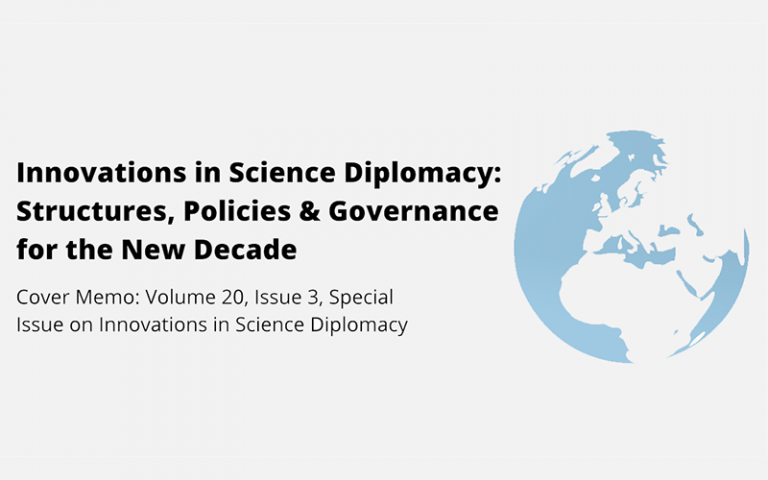Innovations in Science Diplomacy: STEaPP and JSPG collaborate on special issue
24 August 2022
UCL STEaPP and the Journal of Science Policy & Governance (JSPG) have collaborated on a special edition focusing on the latest policy developments and issues in science diplomacy.

The special issue includes 8 articles highlighting a number of topics that range from collaborative efforts in science diplomacy in international organizations and spaces, and fostering national development using Big Science, to national considerations including leveraging scientific diaspora networks and scientists in embassies, all the way to how research in science diplomacy is carried out.
Professor Joanna Chataway, Head of Department in UCL STEaPP, said: “The quality and relevance of these articles are a testament to the untapped potential of ECRs and their contribution to the field of science diplomacy."
The special edition also includes an op-ed by George Salter, PhD candidate in UCL STEaPP, which argues for the use of concepts and theories from Science and Technology Studies to better understand the role of scientists in science diplomacy, using outer space governance as an example case study.
The journal opens with a cover memo by Professor Joanna Chataway and Dr JC Mauduit, Lecturer in Science Diplomacy at UCL STEaPP, which has been re-published in its entirety below.
Cover Memo: Volume 20, Issue 3, Special Issue on Innovations in Science Diplomacy
On behalf of the Department of Science Technology, Engineering & Public Policy, University College London, it is our pleasure to introduce Volume 20, Issue 3, of the Journal of Science Policy & Governance (JSPG), which focuses on Innovations in Science Diplomacy: Structures, Policies & Governance for the New Decade.
Many of the challenging global issues of our times are underpinned by science, technology, and innovation (STI), and require evidence-informed, multi-stakeholder and transdisciplinary approaches. As a research unit, UCL STEaPP was founded in the recognition that science, technology and engineering expertise are vital to tackling today’s most pressing global challenges. The department’s staff work on many issues of science policy and science diplomacy, with a particular emphasis on policy impact and practice and direct links to governments and international organizations.
As a university department, STEaPP is also invested in training and sensitizing future policymakers and scholars to science policy and diplomacy issues through its Master of Public Administration and PhD programs. Therefore, beyond the obvious pervasive issues of inclusivity, it recognizes how crucial it is to elevate the voices of emerging scholars and young leaders. This is where the values of JSPG and UCL STeaPP are in perfect alignment, and why the partnership on this special issue emerged naturally.
Over the last decade, science diplomacy has been a rising field of scholarly attention, but many areas are still under-explored, as reflected in the diversity of the questions put forward for the special issue. What policies (national and international) could help foster better interactions between scientific actors on the one hand and diplomatic ones on the other? What should future formal and informal global science diplomacy networks look like to best tackle complex STI-driven issues and achieve positive societal change? What are examples or case studies of actions to be taken or policies to be designed in order to address cross-border interests, or help with global STI challenges?
Early career scientists and young diplomats have also shown a keen interest in developing the field and have a lot to contribute to it. However, opportunities to do so academically have been limited, due to the relatively small size of the science diplomacy research community, the lack of funding characteristic of new and transdisciplinary fields, and the few existing avenues for publication in science diplomacy. This is what this special issue hopes to remedy. Doing so is key to taking a fresh look at the field and introducing innovative ideas on how to build improved science to diplomacy interfaces, governance structures and global policies.
The resulting special issue provides new insights and recommendations on a number of issues in science diplomacy that will be useful to scholars, nations and international organizations, among others. Indeed, topics published in the special issue range from collaborative efforts in science diplomacy in international organizations and spaces, and fostering national development using Big Science, to national considerations including leveraging scientific diaspora networks and scientists in embassies, all the way to how research in science diplomacy is carried out.
The quality and relevance of these articles are a testament to the untapped potential of early career researchers and their contribution to the field of science diplomacy, including those who, in addition to publishing in the issue, won the competition by an external review committee.
UCL STEaPP would like to thank the entire JSPG staff, editorial board, and authors for their immense contributions to this special issue, with particular thanks to Editor-in-Chief, Rosie Dutt and Assistant Editor-in-Chief for Special Issues, Andy Sanchez, for their leadership in managing the editorial process for this issue, and to the competition reviewers.
By Professor Joanna Chataway, Head of Department at UCL STEaPP and Dr Jean-Christophe Mauduit, Lecturer in Science Diplomacy at UCL STEaPP and JSPG Senior Advisor for International Engagement.
Source
Journal of Science Policy & Governance
 Close
Close

